Have you ever been in the middle of something important on your computer, perhaps downloading a file or trying to access a website, and suddenly, everything just stops? It's a frustrating moment, for sure, when a connection you thought was solid just vanishes. This kind of sudden disconnect can feel like someone on the other end just pulled the plug without a word, and in a way, that's almost what happens with certain computer messages.
It turns out there's a particular kind of digital hiccup that often shows up as "10054" or sometimes, you know, a message saying something like "connection reset by peer." This means that the computer you were trying to talk to, or the server holding the information you wanted, decided to end the conversation, and it did so without the usual polite goodbyes. It's a bit like being on a phone call and the other person just hangs up unexpectedly, leaving you wondering what happened.
This message, 10054, can pop up in all sorts of situations, from everyday web browsing to more specialized tasks like working with certain software or even when trying to connect to a server for development work. It's a common signal that something went awry with the network link, and thankfully, there are usually reasons why it happens and, more importantly, ways to try and sort it out. So, we're going to explore what this message means and how you might get things back on track.
Table of Contents
- What's the deal with 10054?
- The 10054 signal - What it means.
- Why does this 10054 message pop up?
- Common culprits behind 10054.
- How can we get past 10054 problems?
- Steps to mend 10054 issues.
- Other ways to tackle 10054 situations.
- Addressing specific 10054 scenarios.
What's the deal with 10054?
When you see a 10054 message, it's essentially your computer telling you that a connection it had open was suddenly shut down by the machine on the other side. This isn't just a simple break in the internet, but rather, a specific kind of digital "reset" initiated by the remote computer. It’s a bit like a door slamming shut when you expected it to stay open, you know? This particular error code is part of a group of messages that deal with how computers talk to each other over networks, often called "socket errors."
These socket errors are, in fact, some of the more common issues folks run into when using their computers for anything that involves sending or receiving information across a network. The 10054 error itself points to a situation where an existing link just got messed up. It's not always easy to figure out why it happened right away, but the message is a clear sign that the conversation between your machine and another was cut short. It truly can be quite perplexing when it happens without warning, and you're left wondering what went wrong.
The 10054 signal - What it means.
The core meaning of the 10054 signal is that the computer or server you were trying to communicate with decided to stop the connection. This can manifest as a "connection reset by peer" message, or simply "an existing connection was forcibly closed by the remote host." It means the computer on the other end, the one you were trying to reach, ended the link without a proper closing sequence. It's like a phone call that just drops, with no warning, which is very much the case here.
- Fll Airport
- Trump Senior Citizens Food Program Changes
- Jp Staples
- Indy 500 President Trump Invitation
- Minion Memes
This abrupt ending is different from a connection simply timing out or being unable to establish in the first place. With 10054, the connection was, in fact, successfully made, but then something happened on the other side that caused it to be cut short. It could be that the program you were interacting with on the remote machine suddenly stopped working, or perhaps the other computer itself restarted. Sometimes, it's even simpler, like the network part of that computer just getting turned off. In some respects, it's a message indicating a sudden, unexpected interruption from the other party.
Why does this 10054 message pop up?
There are several reasons why you might see the 10054 message appear, and they mostly stem from something happening on the remote computer or within the network path between you and it. It's not usually something your computer did wrong, but rather, something that occurred on the other side of the digital fence, so to speak. This error often points to a sudden and ungraceful end to a network session. You know, it's like a sudden jolt in the system that breaks the connection.
One common scenario is that the application or program running on the remote computer, the one you were connected to, simply stopped working. Maybe it crashed, or someone manually shut it down. When that happens, the connection it was holding open gets dropped, and your computer gets the 10054 message. Another possibility is that the entire remote computer was restarted. If a server reboots, all its active connections are, of course, severed, leading to this very message on your end. It's quite a direct consequence of such events, you might say.
Common culprits behind 10054.
Beyond applications stopping or reboots, other factors can cause the 10054 error. Sometimes, the network interface on the remote computer might be disabled. This is like unplugging the network cable from their side, which naturally cuts off any ongoing conversations. Or, the remote machine might use what's called a "hard close" on the connection, which is basically pulling the plug without any negotiation. This is less common but can certainly lead to the 10054 signal popping up, as a matter of fact.
Network problems are also big contributors to the 10054 message. This could be something like a general network failure, too much traffic causing congestion, or even incorrect settings in the network setup. If the network between your computer and the remote host can't respond properly, the connection will break, and you'll likely see this error. For example, if you're trying to reach a server and the internet connection itself is flaky, that could easily cause this particular problem, you know?
How can we get past 10054 problems?
Dealing with 10054 errors means looking at both your end and the remote end, as well as the path between them. Since the error often points to something on the remote side, sometimes the solution involves changes there, but there are also things you can try on your own computer. It's about systematically checking possibilities, which can feel a bit like detective work, but it's usually worth the effort. Basically, you're trying to figure out where the break in the chain is.
For specific instances, like when the 10054 error happens on Windows 7 or Windows Server 2008 R2, especially if a certain type of network driver is involved, there might be a specific fix available. This often involves getting a special update, sometimes called a "hotfix," from the software maker. Applying such an update can often sort out the problem directly, which is very helpful. You might also need to adjust some deep settings in your computer's system, like within the registry, and perhaps check certain file details to make sure everything is as it should be.
Steps to mend 10054 issues.
When trying to mend 10054 issues, the first step is often to consider the most common causes. If it's a general network connection issue, you might want to check your own internet connection. Is it stable? Are other websites or services working? Sometimes, a simple restart of your router or modem can clear up minor network glitches. It's a bit like giving your network a fresh start, and that can surprisingly fix many things, you know?
If the problem persists, especially with a specific application or server, it's worth considering if the issue is with that particular software or the remote machine. If you have control over the remote computer, checking its logs for crashes or unexpected shutdowns can provide valuable clues. For network problems, looking at your network setup, checking for firewalls that might be blocking connections, or even temporarily disabling antivirus software (just to test, then re-enable) can sometimes reveal the cause of the 10054 error. It's a process of elimination, really, to figure out what's getting in the way.
Other ways to tackle 10054 situations.
Beyond the general troubleshooting, there are specific contexts where the 10054 error appears, and these might require a more focused approach. For instance, if you're using development tools like Git, you might encounter a "Git OpenSSL errno 10054 connection refused" message. This suggests an issue with how Git is trying to establish a secure connection with a server, and the server is, for some reason, not allowing it. It's a rather specific kind of rejection, apparently.
In such cases, the problem isn't just a general network cut-off but points to something more particular about the secure handshake process. This could involve issues with your Git configuration, the OpenSSL libraries on your system, or even the server's security settings. Solutions might involve updating Git, reconfiguring its SSL settings, or checking if the server's security certificates are valid and trusted. It’s definitely a situation where the problem has a very specific digital fingerprint, you might say.
Addressing specific 10054 scenarios.
Another specific scenario where the 10054 error can pop up is when you're trying to connect to a "linked server" after recent operating system updates. This is a common issue in environments where database systems are set up to talk to each other. Sometimes, updates to the Windows Server operating system can change how these connections are handled, leading to the existing links being forcibly closed. This is a very particular interaction between system updates and established network links, you know?
To address this kind of 10054 problem, you'd typically look at the recent updates that were installed on the Windows Server. There might be specific knowledge base articles or patches released by the software vendor to fix compatibility issues introduced by those updates. It might also involve reviewing the network settings on the server or adjusting the security protocols used for the linked server connection. It really shows how even seemingly small system changes can have a ripple effect on network communications, you know, causing these kinds of sudden stops.
Related Resources:
Detail Author:
- Name : Joanne McGlynn
- Username : lubowitz.tiffany
- Email : tillman.dee@yahoo.com
- Birthdate : 2001-01-30
- Address : 829 Smith Lodge Apt. 984 New Vinnieport, DE 52267
- Phone : 920-345-8814
- Company : Wintheiser-Lebsack
- Job : Physics Teacher
- Bio : Iure fugiat voluptatem dolorem. Consequatur placeat molestiae quo itaque et. Est totam hic fugit aperiam. Ipsa quo ipsum nihil quaerat quaerat.
Socials
linkedin:
- url : https://linkedin.com/in/ahagenes
- username : ahagenes
- bio : Ut autem libero iure quis quisquam amet.
- followers : 4465
- following : 986
twitter:
- url : https://twitter.com/ahagenes
- username : ahagenes
- bio : Assumenda reprehenderit consequatur sint ipsam. Et nihil iure quia et eligendi rerum libero. Velit molestiae doloribus maxime quaerat.
- followers : 2854
- following : 244
instagram:
- url : https://instagram.com/anselhagenes
- username : anselhagenes
- bio : Repudiandae et architecto laborum velit vero itaque. Voluptate ut omnis quia.
- followers : 107
- following : 2942
facebook:
- url : https://facebook.com/ahagenes
- username : ahagenes
- bio : Non sit ea tempora.
- followers : 467
- following : 2064


